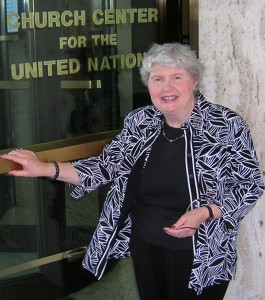
 Judith A. Colbert, PhD is an experienced writer, researcher and training specialist. She is the principle author of both the National LINC Childminding Requirements and Occasional Child Care Requirements. As an early care and education consultant with an international perspective, her goal is to build bridges between research and practice, mainstream and newcomer experiences.
Judith A. Colbert, PhD is an experienced writer, researcher and training specialist. She is the principle author of both the National LINC Childminding Requirements and Occasional Child Care Requirements. As an early care and education consultant with an international perspective, her goal is to build bridges between research and practice, mainstream and newcomer experiences.
I recently had the pleasure of speaking with Dr. Colbert about her book, Welcoming Newcomer Children: The Settlement of Young Immigrants and Refugees, and her speaking engagement at the United Nations (UN).
Welcoming Newcomer Children
Welcoming Newcomer Children is a resource for teachers and anyone with an interest in supporting young newcomers from birth through kindergarten. In the book, Judith offers a new perspective on the settlement of children, and suggests new strategies for working with immigrant children in the early years.
Not only does Judith’s book draw upon international research in various fields, but it also provides analysis and encourages reflection. Judith successfully contextualizes all of the research, and gives meaning to the reader by inviting reflection and providing practical advice in sections like “Implications for Practice,” and “Something to Think About”.
Welcoming Newcomer Children explores settlement as a process of transition using the voices of newcomer parents and children, researchers, caregivers and teachers. Judith describes adults as an essential part of children’s settlement experience, but reminds us that “settlement belongs to the child.” With this understanding, Judith explains the importance of developing “professional practices that sustain program quality and help newcomer children achieve their settlement goals.”
United Nations Speakers Series
Dr. Colbert was invited to speak about her book and research at the United Nations (UN) in New York on June 6, 2011. Her presentation was part of the Speaker Series, an initiative of the NGO Committee on UNICEF Working Group on Education (WGE) planned by the World Organization on Early Childhood Education (OMEP).
Judith was honored by the opportunity to address the international community with her lecture titled, Immigrant and Refugee Children: Their Distinctive Needs.
In her lecture, Judith focused on the urgency of identifying, recognizing and responding to the needs of young children. She discussed the settlement needs of young newcomer children, with a particular focus on refugees, the effects of trauma, and attachment difficulties while adapting to a new culture.
Judith addressed influential policy makers to explain how support that addresses the settlement needs of very young migrants can lay a foundation not only for positive educational outcomes, but also for positive outcomes for the entire family.
Knowing that intelligent and thoughtful professionals like Judith are presenting at an international level is exciting for the entire Caring for Newcomer Children sector.
In Judith’s words:
“Teachers on the front line, at the interface between newcomer families and their new society, have an opportunity – and a special responsibility – to help young newcomers settle and prepare to take up their responsibilities as citizens of tomorrow. As for the rest of us, we, too, have settlement responsibilities – to support the teachers, welcome the newcomer children and their families in our midst, and celebrate new beginnings.”
Next Steps
With her inspired and insightful approach, Judith suggests the following next steps for further action within the sector:
Caregivers
10 STEPS TOWARD QUALITY PROGRAMMING THAT PROMOTES THE SETTLEMENT OF NEWCOMER CHILDREN
- Focus on each child and his or her parents.
- Observe carefully.
- Be aware of your own point of view and learn as much about the other perspectives as possible.
- Consider established benchmarks of quality.
- Identify the goals and challenges of the newcomer child and parents.
- Modify your practice to support the newcomer child.
- Promote settlement by gradually introducing changes to help the newcomer child feel comfortable and achieve mainstream goals.
- Be patient.
- Respect efforts.
- Celebrate progress with children and parents.
Administrators and Policy Makers
- Focus on the young newcomer child.
- See Early Childhood/Primary Programs as Settlement Support.
- Ensure Teachers/Early Childhood Programs/Schools are “Ready” for young immigrants and refugees.
- Promote and Conduct Research on the newcomer child.
- Adopt Public and Organizational Policies that recognize and address the needs of young newcomer children.
- Implement Programs and initiatives to meet current needs and lay a foundation for positive outcomes.






